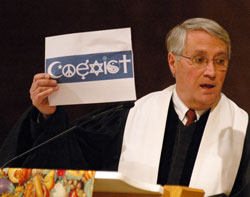Cathedral hosts 10th annual Interfaith Thanksgiving Service

Dr. Robert Welsh, the president of the Council on Christian Unity of the Indianapolis-based Christian Church (Disciples of Christ), holds up an image of a bumper sticker which uses religious symbols to spell the word “coexist” to invite those in attendance to consider that the various world faith traditions are called to more than coexistence, but also to build community. (Photo by Sean Gallagher)
By Sean Gallagher
For the 10th consecutive year, representatives of faith traditions from around the world gathered at SS. Peter and Paul Cathedral in Indianapolis to offer prayers of thanks a few days before the civic holiday of Thanksgiving.
The several hundred people who attended this year’s Interfaith Thanksgiving Service on Nov. 24 heard Jewish, Muslim, Hindu, Sikh, Buddhist and Christian prayers chanted and spoken in Hebrew, Arabic, Sanskrit, Punjabi, Tibetan and English. (See a photo gallery from this event)
The Indianapolis Children’s Choir and the cathedral’s Laudes Cantores choir provided music before and during the service.
Those who represented the faith traditions, including Archbishop Daniel M. Buechlein, live in and around Indianapolis, and showed how people from around the world have come to live here in community.
“We gather to offer a grateful prayer for peace, peace in our world,” Archbishop Buechlein said. “Thank you for being here to help us do that.”
Giora Sharon, a cantor at Congregation Beth-El Zedeck in Indianapolis, represented the Jewish faith at the service. He has participated in the interfaith gathering since its inception.
Born and raised in Hungary before living for 20 years in Israel, Sharon moved to Indiana shortly before the first Interfaith Thanksgiving Service in 2000.
“I like this place,” Sharon said. “I liked it from the first minute that I got here. I find it a very beautiful place. It has a profile of a big city, but it also has the calmness of smaller towns. It’s not crazy. It’s calm.”
Aside from simply liking his surroundings, Sharon said it is important for people who have come to Indianapolis from around the world to gather together at events like the Interfaith Thanksgiving Service.
“We have here various faiths, and they need leaders,” he said. “They need representatives. We have to know each other. We have to understand each other. And we have to respect each other.”
This was the first year that Shakoor Siddeeq, who represented the Nur Allah Islamic Center in Indianapolis, participated in the service.
He echoed Sharon’s thoughts about the necessity for representatives of world faith traditions to come together from time to time.
“We live together,” Siddeeq said. “We play together. We go to school together. We work together. So it’s always important to pray together whenever we have the opportunity.”
Dr. Robert Welsh, president of the Council on Christian Unity of the Indianapolis-based Christian Church (Disciples of Christ), gave a reflection during the service.
Welsh helps lead the official ecumenical dialogue between the Disciples of Christ and the Catholic Church. Archbishop Buechlein is a leader of the Catholic participants in the dialogue.
In his reflection, Welsh expanded upon the need for representatives of faith traditions to come together in mutual respect by calling to mind a bumper sticker that uses various religious symbols to spell the word “coexist.”
“We are called to do more than coexist,” Welsh said. “We are called by our faith to go beyond coexistence to building community, to live as sisters and brothers in seeking the common good, in caring for the needy, in reaching out beyond our fear of the unfamiliar to experience the joy of God’s all-embracing, ever-expanding love and truth and light.”
Welsh then pointed to the action of giving thanks as one way to build up that community among people of various faiths.
“Compassion and care are expressions of our giving thanks to God, whatever our faith tradition or religious background,” he said. “My hope, my prayer, this evening is that all of us might commit ourselves to move beyond mere coexistence to become a true community, a community of thanksgiving and of giving thanks.” †
